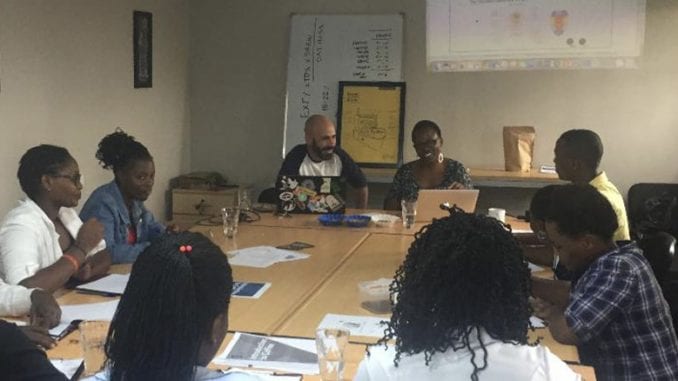
We close our two-part conversation with Rwandan barista trainer and Nestlé Professional Scholarship recipient Perpetue Mukamusinga.
BY ERIKA KOSS
SPECIAL TO BARISTA MAGAZINE ONLINE
From the editor: Last week we began our interview with Perpetue Mukamusinga, Rwanda’s first female barista and trainer who helped East African AeroPress Champion Smayah Uwajeneza climb to success at the competition. Today we wrap up the discussion by talking about Perpetue’s work at Question Café and vision for the future.
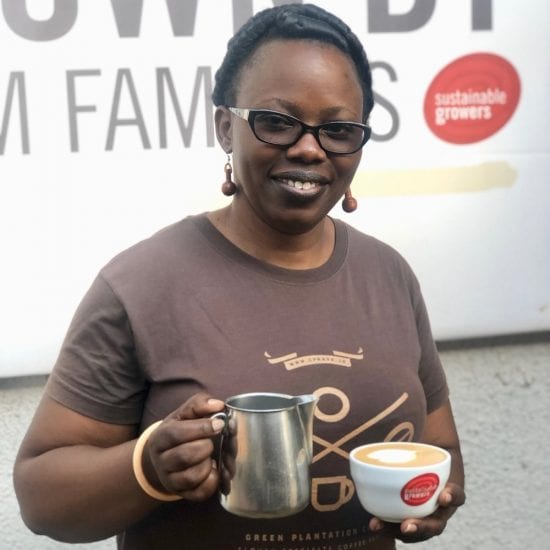
Erika Koss: How did you first begin working as a barista trainer?
Perpetue Mukamusinga: As time passed at Bourbon Coffee, they promoted me to the job of head barista, which meant that I trained all baristas. Then two more cafés started, so I would lead the orientation and training of all new staff to make sure the same quality was there for all the cafés. Later they promoted me to assistant manager of the Bourbon at the Kigali airport.
How did you feel about that promotion?
I was not happy about it, because I was doing paperwork, reports, hiring, and then I wasn’t making drinks. To me, it meant I was on the wrong side of my career.
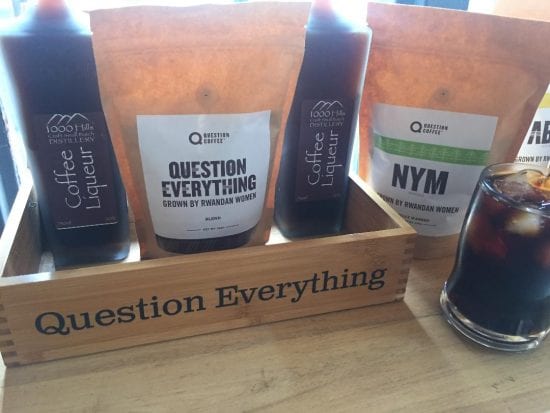
Is that what led you to move to Neo Café in 2013?
No, I didn’t apply to work there. They were new to Rwanda and looking for someone who could help them train baristas, hire staff, and buy equipment. Someone gave them my number, and they started calling me.
What was it like to be a part of the beginning of a new café?
I wanted to try my capacity and grow in my experiences. Also, I have a daughter, so I always want to make life better for her and me.
But everyone was amazed, how could I leave Bourbon, when I had assurance of a good job there? But I thought it was exciting, even though we started from zero. We opened for customers in 2014.
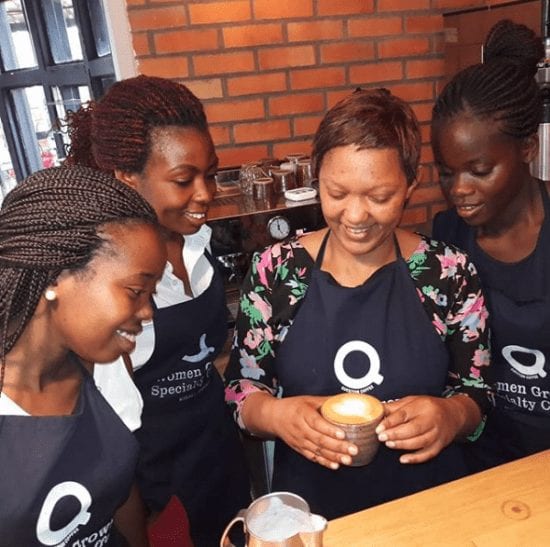
And were there other women on the original team for Neo?
No, I was the only woman there. It was the GM, a roaster, and there were three baristas—all men—and me.
From May 2013 through 2016, you were happy working at Neo. But during this time, Question Café opened in Kigali as the for-profit subsidiary of Sustainable Growers. What led you to work for them?
I had been looking at their website, because I heard they were focused on working on empowering women in Rwanda. They were interested how they could start a training program for baristas. During my interview, their question for me was, “Why do you want to train baristas, especially women?” And I said, “It’s a good key, because there is so much joblessness here, even when girls have degrees.” Because I was also training baristas at hotels, I had the vision that as more and more hotels and restaurants in Kigali started to serve coffee, they would need more baristas. So I thought, if we started training women in coffee, they could get good jobs.
So from the beginning of your job with Sustainable Growers, your job was focused on training baristas?
Yes. The first course I taught was for five women baristas. Smayah was one of those five and now she is a roaster and won the AeroPress Championship in Kenya. Another was Betty, who won the Let’s Talk Coffee Barista Championship this summer. Others went to Dubai or to other jobs, as the barista community was starting to build up. In 2008, we were only seven baristas in the whole country, but now there are at least 100 cafés with hundreds of baristas.
So is it accurate to say that you’ve trained at least half of all the baristas in Rwanda up to 2019?
I’d have to check, but during my years at Bourbon and Neo, I trained about 200. So far with Sustainable Growers, I’ve trained more than 300.
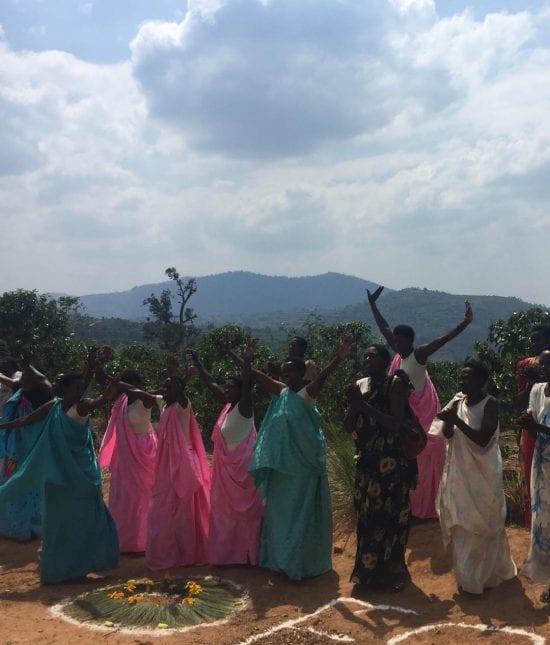
If we go back in time to 2008: Did you ever imagine from that first conversation with the manager at Bourbon that you’d be training baristas? At that time, did you have the dream of a life and career in coffee?
At that time I did not have the dream that I have now. After I started to join the barista team and saw all the coffee lovers, then I started to open my mind and have a new vision.
Back then, did you ever imagine coffee would become this important to Rwanda?
No, at the beginning, it was just a job to support myself and my grandmother. I never thought all this knowledge, improvement of my skills, or travel to other places in the world would be possible for me.
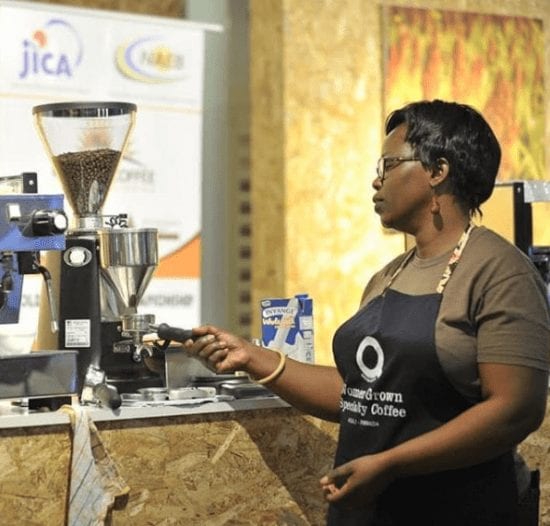
And as you’ve shared with me before, when you first became a barista, you didn’t even drink coffee—only tea!
That is true! And even now, many baristas in Rwanda don’t drink coffee.
But now you drink coffee?
Yes! Now, even at home, I make coffee with an AeroPress, and even my daughter can use it!
What changed?
When I started the sensory evaluation for cupping, I started to enjoy coffee because I started to learn about the flavors and sweetness.
What is your vision for your future now?
I’m working to become an AST (authorized SCA trainer), and I hope to continue to train others in coffee. I also hope one day to have my own coffee shop and my own house with my daughter.
Perpetue, thank you for sharing part of your story with me. I’d like to end our conversation today with two final questions: What has coffee meant to you? And what does it continue to mean?
Coffee has given me a family. Before my work in coffee, I felt like I was alone, because all my family passed away [in the 1994 genocide]. But now, I have a big family, a big network, all around the world. Because of this, I will continue to work as a woman in coffee, and to be more passionate for my career and to inspire other women in coffee.
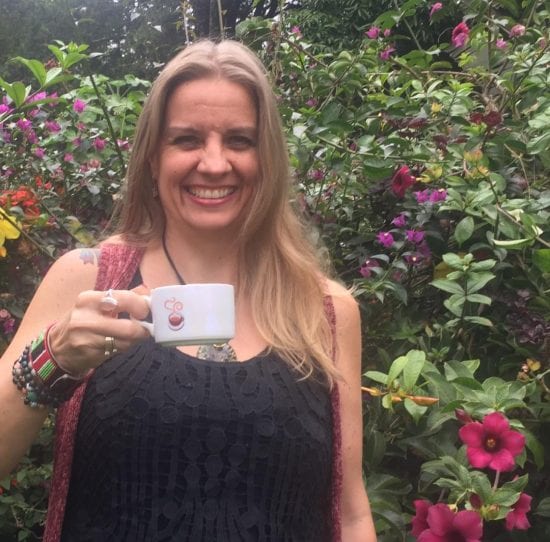
ABOUT THE AUTHOR:
Erika Koss’ coffee career began in 1995 as a barista in San Diego. Now living in Nairobi, Kenya, she is a Research Associate at the University of Nairobi, a Ph.D. candidate in International Development Studies at Saint Mary’s University in Halifax, Nova Scotia, and an Authorized SCA Trainer. Follow her on Instagram @aworldinyourcup.

